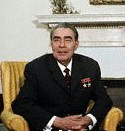
'Brezhnev - married into group sex' - Revol

'Brezhnev - married into group sex' - Revol
LEONID BREZHNEV
(1906-82). Less than six years after the death of Leonid Brezhnev, his 18-year reign as Soviet leader was officially denounced as the era of stagnation. In the liberated atmosphere of glasnost (openness) and perestroika (restructuring), he was vilified for the shocking decline of the Soviet economy and for the rampant cronyism that had bloated the Communist party.m At the annual party congress in mid-1988 Mikhail Gorbachev, who was the third of the former chairman's successors as general secretary, criticized the inflated cult of Brezhnev - the great fighter for peace, the great Leninist, the great theorist, the hero of Soviet culture.
The disgraced name of Brezhnev was removed from a city, at the request of its citizens, and from streets, squares, and public buildings. Then in 1989 he was stripped of the Order of Victory, a military honor he reportedly did not deserve. Meanwhile, the de-Stalinization movement, which Brezhnev had smothered when he assumed power, was revived.
Under Brezhnev's leadership the Soviet Union had invaded Czechoslovakia in 1968 and Afghanistan in 1979. The justification was the so-called Brezhnev Doctrine, which asserted that Communist nations had a right to intervene in one another's affairs if a Warsaw Pact partner was pursuing policies detrimental to the common interests of the others. The concept was extended to Marxist-style governments beyond Eastern Europe. Multibillion-dollar annual bailouts of Afghanistan, Cuba, Nicaragua, and Vietnam were part of the Brezhnev legacy condemned by the new Soviet leadership. It also questioned his authority as the spokesman for the policy of detente, or normalization of relations with Western nations.
Leonid Ilich Brezhnev was born on Dec. 19, 1906, in Kamenskoye (now Dneprodzerzhinsk) in the Ukraine. In 1923 he joined Komsomol, the Communist youth organization. His political career began when he joined the Communist party in 1931. A graduate of the Dneprodzerzhinsk Metallurgical Institute in 1935, he worked as an engineer and director of a technical school. He also held a number of local party posts. By 1939 he was the secretary of the regional party committee of Dnepropetrovsk.
A political commissar in the Soviet army during World War II, Brezhnev rose to the rank of major general. After the war he became first secretary of the Central Committee of the Moldavian Communist party. Brezhnev was elected to the Supreme Soviet of the Soviet Union in 1950, and he became a member of the Central Committee of the Soviet Union's Communist party in 1952. Under Nikita Khrushchev, whose protege he became, Brezhnev took over the "virgin lands" project to develop Kazakhstan as an agricultural heartland. By 1960, as chairman of the Presidium of the Supreme Soviet, he became titular head of the Soviet state.
Brezhnev became Khrushchev's assistant as second secretary of the Central Committee in July 1964. Shortly thereafter, however, he joined the coalition forcing Khrushchev out of power on Oct. 15, 1964, and he succeeded Khrushchev as head of the party's Central Committee. After a period of collective leadership with Premier Aleksei Kosygin and with Nikolai Podgorny, chairman of the Presidium, Brezhnev became the Soviet Union's general secretary in 1966.
In May 1976 Brezhnev became a marshal of the Soviet Union; except for Stalin, he was the only Communist party chairman also to hold the highest Soviet military rank. A year later he became chairman of the Supreme Soviet, the first leader to head both the Presidium and the Communist party. In 1979 Brezhnev received the Lenin prize for literature (later recalled). He died in Moscow on Nov. 10, l982.